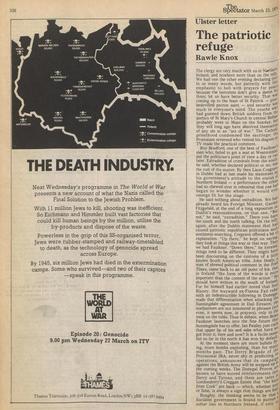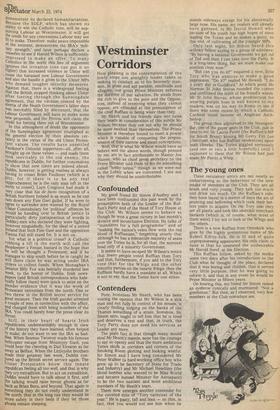Ulster letter
The patriotic refuge
Rawle Knox
The clergy are very much with us in Northern Ireland, and nowhere more than on the tellY. We had one the other evening declaring (rOt in so many words, but patently with this■ emphasis) to hell with prayers for peace because the terrorists don't give a damn for them; let us have better security. That was coming up to the feast of St Patrick p00 bedevilled patron saint — and security wa„s much in everyone's mind. The youths wh" had gunned down British soldiers from the., portico of St Mary's Church in central Belfas1/ probably went to Mass on the Sunday, 1/11! they will long ago have absolved themselve,' of any sin in an "act of war." The Catholic priesthood condemned the sacrilege; the Protestant reverend who vented his disgust °I1 TV made the practical comment. Roy Bradford, one of the best of Faulkner's men who, failed to get a seat at Westminster,. put the politician's point of view a day or tW° later. Extradition of criminals from the south' he said, whether declared political or no, Was the nub of the matter. By then Liam Cosgrave in Dublin had at last made his statement onf his government's attitude to the status ° Northern Ireland — a performance the critics had so chewed over in rehearsal that one had: begun to wonder whether it would eve' emerge fit for the stage. He said nothing about extradition. We had already heard his Foreign Minister, Garrett Fitzgerald, at the end of a long exposition °n, Dublin's reasonableness, on that one. "131.1; not," he said, "extradition." There you have the south and the north talking. On the tellY again, after the Dublin statement that had caused patriotic republican politicians ail sentiment-searching, Cosgrave offered a bit o explanation. "Up there," he kept on saying'l they look at things this way or that way. Thein we had Faulkner. "Down there," he iteratech things tend to be different. They might have been discoursing on the customs of a little known South American tribe. John Healy,. man of shrewd political comment in the Iris!' Times, came back to an old point of his, that in Ireland "the form of the words is r110,,r! important than the content of the action.'' should have written in the south of Irelahu.i For he himself had earlier noted that Nei, Blaney, the wayward ex-Fianna Fail rebe,' with an indestructible following in Doneka made that differentiation when attacking t„.1`: Sunningdale agreement in Dail Eireann; tr't northerners are not interested in phrases (n,°.„ even, it seems now, in prayers), only in tn.; meat on the table. Thus in debate, when Bria", Faulkner launches into the fine future tha" Sunningdale has to offer, Ian Paisley just curl! that upper lip of his and asks what have W' got from it, here and now? It is a facile sneer', but so far in the north it has won by default' At the moment there are more bullets flYing, more bombs exploding, than for ma2)10 months past. The Derry Brigade of tV,5 Provisional IRA, never shy in predicting ",, operations, announces that its camPa'.0 against the British Army will be stepped up'e the coming weeks. The Donegal Provos aro known to have moved reinforcements int.„1 Derry and Tyrone, and there are tales I', Londonderry's Creggan Estate that "the boY' from Cork" are back — which, whether WY or false, is always a sign that things are ha Roughly, the thinking seems to be that 3 Socialist government is bound to pursue 0 softer line in Northern Ireland, if only t
demonstrate its declared humanitarianism. Because the SDLP, which has shown its ability to win the Catholic vote, will be supporting Labour at Westminster, it will get the credit for any concessions Labour may see fit to make. Therefore: make peace impossible at the moment, demonstrate the IRA's 'mintarY strength,' and later perhaps declare a ceasefire to see if Harold Wilson is sufficiently impressed to make an offer. To many Catholics in the north this line of argument ignores the irritation (one can put it no higher) that increased violence in Ulster will cause the harassed new Labour Government and also the handle it gives to the Ulster MPs Who demand tougher security measures. Against that, there is a widespread feeling that the British stopped thinking about Ulster after forcing through the Sunningdale agreement, that the vacuum created by the inertia of the Heath Government's latter days Was inevitably filled by discontent, that the Labour Government will have to make some new proposals, and the Provos will claim the credit for forcing them out of Westminster.
In this atmosphere of doubt the opponents of the Sunningdale agreement triumphed at the general election by their absolute certainty in the virtue of the old Ulster Protestant values. The results have unsettled Faulkner's Unionist supporters—all, after all, brought up on these values — and made them look inevitably to the old enemy, the republicans in Dublin, for further concessions to show that new times are indeed ahead. Dublin, however, is getting restless at always having to cosset Brian Faulkner (which is a Pity; for if there is to be any real rapprochement he is the only man left in the north to cosset). Liam Cosgrave had made it very clear that his de facto recognition of a British Northern Ireland is as much as he can ram down any Fine Gael gullet. If he were to agree to surrender men wanted by the Royal Ulster Constabulary for 'political' offences he would be handing over to British justice (a Particularly dirty juxtaposition of words in Dublin) men who declared they were fighting, however misguidedly, for the ideal of a united Ireland that both Fine Gael and the opposition Fianna Fail still stand for. It is not on.
Yet what is a political crime? A Catholic robbing a till in the north will call the Shopkeeper a Fenian bastard in the hope that he will be thought a Protestant; and if he Manages to skip south before he is caught he Will there claim he was acting under IRA orders to collect funds. When Monaghan's Senator Billy Fox was bestially murdered last Week, to the horror of Dublin, Irish newsPapers (and British correspondents who habitually follow them) were quick to seize on the Slender evidence that it was the work of Protestant extremists from the north. One or two threw in the British secret service for good measure. Then the Irish gardai arrested a couple of men in connection with the affair, and charged them with being members of the IRA. You could barely hear the press clear its throat.
Still, in their heart of hearts Irish republicans, understandably enough in view of the history they have learned, often helped to make, do not want to see the IRA as baddies. When Seamus Twomey made his famous helicopter escape from Mountjoy Gaol, you could hear the cheering in Dail Eireann as far away as Belfast. When the Littlejohn brothers Made their getaway last week, Dublin conjured up the British secret service again. The Ulster Protestants know this innate republican feeling all too well, and that is why they cry extradition. But to act on extradition, Dublin would have to talk about it first, and the talking would raise heroic ghosts as far back as Brian Boru, and beyond. That again is something they do not really understand in the north: that in the long run they would lie More safely in their beds if they let those ghosts remain sleeping.



































 Previous page
Previous page